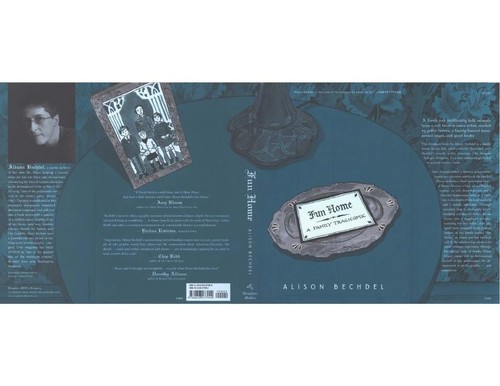In 2006, Alison Bechdel gifted the world with Fun Home: A Family Tragicomic, a graphic memoir that transcends the typical boundaries of the genre. This is not just a story about a childhood; it’s an exploration of identity, sexuality, and the complex, often painful, bonds of family. Bechdel, a cartoonist known for her long-running comic strip “Dykes to Watch Out For,” uses her artistic talent and sharp intellect to craft a narrative that is both deeply personal and universally resonant. The book’s genesis stemmed from a period of intense self-reflection following her father’s sudden death, leading her to excavate her family history and, in turn, her own identity. The impact of Fun Home continues to be felt today, prompting discussions about family secrets, queer identity, and the power of graphic storytelling. Find it on Amazon.
The narrative unfolds primarily in the author’s childhood home, a Victorian-era house that also served as the family’s funeral home—the “fun home” of the title. This juxtaposition of life and death, ordinary and macabre, forms the foundation of the story. Bechdel weaves together memories of her childhood with literary allusions, creating a rich tapestry of experiences. She recounts her complicated relationship with her father, Bruce, a man who was both a pillar of their small town and a closeted homosexual. Her father’s passion for restoration and literature, particularly the works of Proust, Joyce, and Camus, is juxtaposed with his repressed desires and emotional distance. The setting, both physical and emotional, is meticulously constructed, mirroring the family’s internal struggles. This creates an atmosphere that is at once nostalgic and unsettling.
Alison herself is a complex and fascinating protagonist. From a young age, she grapples with her own burgeoning sexuality, identifying more with the “butch” characters in her books than with the feminine ideals of her time. Her relationship with her father, a man she both admires and fears, is the core of the narrative. Bechdel painstakingly examines her childhood memories, trying to understand his actions, his secrets, and ultimately, herself. Her coming-of-age story is not just about realizing she is a lesbian; it’s about understanding the legacy of her family and how it shapes her identity. The other characters, including her reserved mother and her two younger brothers, each play a vital role in highlighting the dysfunctional dynamics of the family. Her father’s arc, in particular, is a tragic exploration of a man trapped by societal expectations and his own internal conflicts.
Fun Home tackles a myriad of complex themes, including identity, sexuality, family secrets, and the search for self-understanding. Bechdel uses literary allusions and symbolism to deepen these themes, drawing parallels between her own life and the works she studied. The book’s emotional resonance is undeniable. Bechdel’s honesty and vulnerability are deeply moving, inviting the reader into her world and allowing us to share her pain, confusion, and ultimately, her acceptance. What struck me the most is the book’s exploration of how families, despite their flaws and imperfections, shape us profoundly. It made me reflect on my own family dynamics and the often unspoken truths that lie beneath the surface. Explore more on Amazon.
Bechdel’s prose is remarkably candid, insightful, and often witty. Her distinctive voice permeates every page, inviting readers into her intimate reflections. The combination of her narrative style and her striking artwork is a critical aspect of the book’s success. The drawings are not mere illustrations; they are integral to the storytelling, adding layers of meaning and emotion. The pacing is deliberate, mirroring the slow, often painful process of self-discovery. The use of dialogue is sparse but effective, often revealing more about the characters’ hidden emotions than their spoken words. She masterfully uses the graphic medium to explore the nuances of facial expressions, body language, and the unspoken tensions within her family.
Fun Home is more than just a memoir; it is a powerful testament to the human condition. It explores the intricate ways our families shape us, and the complex process of self-discovery. It’s a story about finding one’s place in the world while grappling with the shadows of the past. The book’s unflinching honesty, combined with its intellectual depth, makes it a truly remarkable work. It’s a book that stays with you long after you finish reading, prompting you to reflect on your own experiences with family and identity. The themes of self-discovery, hidden truths, and the weight of family expectations make it a timeless read. Check it out on Amazon.
I would wholeheartedly recommend Fun Home to anyone interested in graphic novels, memoirs, LGBTQ+ literature, or anyone who enjoys thought-provoking, emotionally resonant stories. It is particularly relevant for those interested in family dynamics and coming-of-age stories. Readers who appreciate complex characters and non-linear narratives will find this book particularly rewarding. If you enjoyed Persepolis by Marjane Satrapi or Maus by Art Spiegelman, then Fun Home should definitely be on your reading list. This is a book that deserves to be read and re-read, and it continues to resonate with readers due to its universal themes and profoundly human story. This is a crucial read for anyone interested in understanding the intersection of identity, family, and the power of storytelling. Get your copy today.

